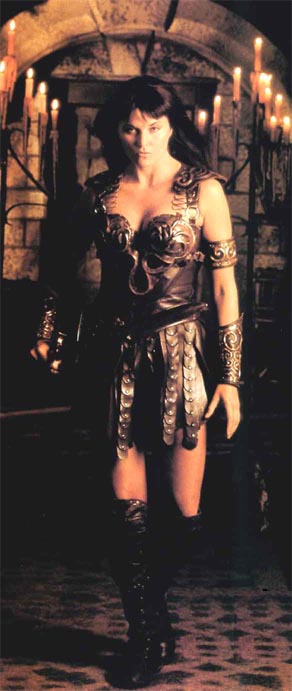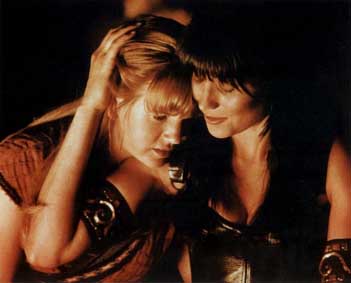
There is a species of TV show that inspires a following of more than regular or even dedicated viewers, but acolytes. Friends has fans, for example, The X-Files has a Following. I'm not sure if it's the shows themselves or their Followings that make the public at large so contemptuous of both, but that's sort of a chicken and egg question, anyway. They are cheap and easy targets because in a marketplace that treasures shows about the same nothings that sitcoms have been about since their inception, they are resolutely about Something. And not the silly somethings so routinely mocked by superior so-and-sos. The X-Files isn't about aliens, it's about truth, and trust, and faith. The Prisoner isn't about getting chased by those silly bubble things, it's about learning serenity in the face of the betrayal which is everywhere, even in your own heart (it's a paranoid show). Star Trek et al isn't about space exploration or who would make the best leader (Picard, duh), it's about broken families and cultural tolerance. And Xena: Warrior Princess isn't a dimwitted lesbian romp, it consciously uses the tools of myth to explore themes of redemption and love.
Now, before or at least shortly after you groan and roll your eyes, consider what a myth is: a story which uses characters and plots to embody ideas or aspects of culture. It is more than drama in that its parameters are regularly stretched to epic proportions, and includes supernatural beings and exaggerated situations. But myth is less than drama for the same reasons. The ambitions and suffering of Prometheus are harder to relate to than the ambitions and suffering of Willy Loman; and as horrible as suicide is, it's more comprehensible than having your liver pecked out daily for centuries. So while Prometheus Bound and Death of a Salesman might both be great theater, their presentation would vastly different.
Likewise, a viewer shouldn't watch XWP and expect to see Law&Order. For while certain Cobra readers (Hi, Evelyn!) have complained about the acting and writing on the show, I have to argue it's a question of taste rather than quality. To accommodate the near constant intrusions of gods and monsters, everything in the Xenaverse has been exaggerated, but consistently and to premeditated ends. One actor on "er" striking poses and cracking wise by turns would be embarrassing, but when everybody in XWP is doing it, they are part of an aesthetic that I'm going to call "Raimism."

Lucy Lawless as Xena
Raimism began in late seventies Michigan with three school friends, Sam Raimi, Rob Tapert, and Bruce Campbell, who made countless Super-8 movies under Raimi's direction. Their finest effort as amateurs was a short film called Within the Woods. It generated enough acclaim that they were able to raise $350,000 and make it into the feature length The Evil Dead-The Ultimate Experience in Grueling Horror with Raimi as director, Tapert as producer, and Campbell as star. With this film, a major distraction at the 1982 Cannes Film Festival, the principles of Raimism were established: smart ideas, exuberant execution, and overriding good humor. Raimism distills the conventions that make movies fun, then makes them funny.
While the output of Renaissance Pictures-Raimi, Tapert, and Campbell's production company-has been uneven, it has produced some genre gems (the Evil Dead trilogy, American Gothic, Darkman, The Quick and the Dead, among them) which inject the mythic and slapstick in equal parts to the proceedings with unique, unmistakable results-a Three Stooges production with the bones of a Shakespearean tragedy. And if that combination seems a bit unwieldy, it is perfect for a show (led by Tapert with occasional appearances by Campbell) with a cast of New Zealanders impersonating ancient Greeks, Romans, and Persians, speaking modern slang in all-American accents.
Like the best Renaissance Pictures, Xena: Warrior Princess starts with an intrinsically dramatic premise and runs. In this case, Xena was a vengeful annihilator whose one good deed (protecting the lone survivor, a tiny baby, of a targeted village) cost her her warlord status, and nearly her life. It also gained her the eternal ire-and later fascination-of Ares, the god of war, who never forgave (or entirely believed) his most effective soldier's defection to the side of Right and Good. And it's easy to see his point. Even reformed, Xena is a walking encyclopedia of evil acts, and in the old days was so ruthless she made Odin's blood run cold. That's why even at it's inception, XWP had more going for it than it's progenitor, the hokey-jokey Hercules: The Legendary Journeys. Hercules was a genial demigod, easy on the eyes and brain, and with a weak spot for his human half-brothers; but even a repentant Xena is pretty scary.

Sam Raimi

Bruce Campbell in Within the Woods

Gabrielle (Renee O'Connor) & Xena
Gabrielle has a moral core that is vulnerable only to her own insecurities. Xena worships Gabrielle's moral clarity, Gabrielle resents it. Her struggle with goodness is as palpable, if not as pronounced, as Xena's with evil, and has resulted in her elevation to Amazon queen and her degradation as mother of a demon. That's not a figurative demon, by the way, and that a person as intrinsically good as Gabrielle could give birth to a monster is not a fluke-it's part of the eternal flux of good and evil, or more appropriately, the hate and love that constantly create one another in the Xenaverse. Xena abandoned a son in the bad old days who became against all odds a fine boy. Gabrielle had a daughter who destroyed him. The repercussions were so operatic they became an opera, "The Bitter Suite" from Season Three.
And that's another wonder of Xena: Warrior Princess--the writers' and producers' willingness to craft bold ideas with bold strokes. Fights aren't just fights, they are violent extravaganzas in which Xena demonstrates supernatural prowess (she is rumored to be Ares's daughter, and her Chakram may be a token of her godly parentage), and everybody has supernatural recovery rates. Individual episodes may be comedies, tragedies, parodies, or cautionary tales; and while even hard core Xenaphiles are apt to criticize the mix, cultural myths take the same forms.
And like those myths, XWP takes place in an indefinite past. Gabrielle bested Homer and Euripides in a bard competition. Xena's foes are as diverse as Julius Caesar and the Archangel Michael, and has rescued Prometheus and Cleopatra among others. Just this season, she slew Mephistopheles, tricked Lucifer into becoming the new king of hell, then joined forces with Beowulf to fight Grendel (whom she had a hand in creating years before). The show's writers do not adhere to orthodox versions of myth and history, and since both are mighty confused they shouldn't be grievously faulted for that. Rather, they drop names with cultural cache into the narratives. For example, in a series of events too complicated to relate here, Xena was miraculously impregnated with a child whose birth was prophesied to bring about the end of the Greek gods. When the child was born, Xena named her Eve. Due to a few more complications, Xena wasn't available to raise Eve, so she was taken in by the Roman royal family who renamed her Livia and turned her into a vicious despot. Now Eve couldn't have been the mother of humanity as in the Judeo-Christian tradition because humans already existed, but her birth marked the end of traditional Greco-Roman faith and the beginning of something like Christianity. Likewise, her years as Livia don't match the historical Livia's life, but her name has such a potent connotation of Roman evil that even before you learn what she's been up to you know its trouble.
The most important component of Xena: Warrior Princess is the actress who plays the title character. Lucy Lawless is the best female interpreter of Raimism, as comfortable with that idiom as Joe Mantegna is with David Mamet's plays and Wendy Hiller was with Bernard Shaw's. There is a pure physicality to her that lends itself to both a personification and send up of heroism. She is an agile comedienne who can also embody raw heartache; and though it's not the sort of thing that wins awards, Meryl Streep couldn't play the role better. That's why assertions of Xena and Gabrielle's lesbian relationship seem not so much wrong-though both have had numerous affairs with men-as reductionist. Xena and Gabrielle, as played by Lawless and Renee O'Connor, represent all aspects of yin and yang. Men are not rejected so much as they are extraneous. That said, they do take a lot of baths together. But, if nothing else, Lawless is the only actress in television who can plausibly be described as "mighty" (don't you dare mention that twig Buffy), and the concept of her laying waste to other programs is tonic in a medium where nearly all female body types could be classified as Flockhart- or Roseanne-esque.
Nothing I write could make you like Xena: Warrior Princess. "The Bitter Suite" will never be performed by the Met, and the television establishment is too busy honoring garbage like The Practice to take heed of a program so daring and fun, but if you tune in for the next few months (which are the last few months of original Xena programming), you may find that it is more than you thought.

Kevin Smith as Ares

Bruce Campbell as the Prince of Thieves (with Chakram)

Producer Rob Tapert with Mrs. Tapert, Lucy Lawless

Xena & Gabrielle
Back to Cobra Miscellany
Back to Cobra Movies
Xena Sites of Note:
Whoosh! (interviews and commentary)
Episode Guide for Aussie Xenites (best source for pictures)
Official Xena Site
Deadites On-Line (excellent Evil Dead resource)
Thank you to Lady Kate and the other Xena enthusiasts at the Hercules and Xena Forum for spotting and correcting errors in this article!